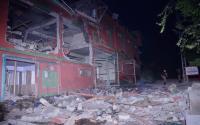Suzanne Goldenberg in Washington and David Leigh 10 May 2004
Fresh revelations about Iraqi prisoner abuse - with photographs of a naked, cowering detainee in front of barking dogs - overwhelmed the Bush administration's efforts to contain the scandal yesterday and placed the future of the defence secretary, Donald Rumsfeld, in further jeopardy.
The photographs, which appear in the New Yorker magazine today, undermined White House efforts to limit damage by announcing the first prosecution of a soldier from Abu Ghraib prison near Baghdad.
Misgivings about the Pentagon leadership came from unexpected quarters yesterday. A series of interviews with senior officers in the Washington Post painted a disturbing portrait of a military establishment harbouring grave doubts about the leadership.
The fresh images will also add piquancy to a House of Commons appearance today by Geoff Hoon, the British defence secretary, who will have to explain exactly when ministers were told of the Iraqi abuse allegations. The Red Cross and Amnesty International have said they passed on their concerns more than a year ago.
Last night Tony Blair apologised to any Iraqi prisoners abused by British soldiers.
"We apologise deeply to anyone who has been mistreated by any of our soldiers," he said during an interview on French television.
"That is absolutely and totally unacceptable. Those who are responsible for this - if they behaved in this appalling way - they will be punished according to the army discipline and rules."
With no sign that the furore was abating in Washington or London, outraged senators yesterday demanded greater accountability from the Pentagon as new evidence of a wider pattern of abuse emerged.
One accused soldier has indicated that she was ordered to "soften up" prisoners ahead of interrogation. The Justice Department is poised to open criminal investigations into allegations that CIA officers were involved with a group of Navy Seals who beat an Iraqi prisoner to death.
The scandal has piled pressure on Mr Rumsfeld to stand down, but the White House was standing by its man at the weekend.
"As a former secretary of defence, I think Donald Rumsfeld is the best secretary of defence the United States has ever had," said Vice President Dick Cheney on Saturday night. "People ought to let him do his job".
But Republican as well as Democratic legislators on Capitol Hill remain unconvinced, and there were also signs of a crisis of confidence in the military establishment at Mr Rumsfeld's leadership.
"All the guards are smiling, they're taking all these pictures, because they know that nobody above them is going to object. They have to know that somebody up there is agreeing to it," Patrick Leahy, the Democratic senator from Vermont told ABC television.
The misgivings about the Pentagon leadership did not directly address the abuse scandal. However, the furore about the treatment of prisoners appears to have crystallised discontent about Mr Rumsfeld's strategy for postwar Iraq, and his abrasive style.
One general told the Post that America would lose the war in Iraq unless it had a radical change of course, and he put the blame for the debacle directly on Mr Rumsfeld, and his deputy, Paul Wolfowitz.
"I do not believe we had a clearly defined war strategy, end state and exit strategy before we commenced our invasion," he said. "Had someone like Colin Powell been the chairman [of the joint chiefs of staff], he would not have agreed to send troops without a clear exit strategy. The current OSD [secretary of defence] refused to listen or adhere to military advice."
A special forces officer told the Post: "Rumsfeld needs to go, as does Wolfowitz."
British defence chiefs have long been angered by Mr Rumsfeld's cavalier approach towards military tactics and strategy in Iraq. Last month, General Sir Michael Jackson, the head of the British army, spoke of "military friction" and said: "That the British approach to post conflict [situations] is doctrinally different to the US is a fact of life." Mr Rumsfeld had been blamed in particular for ordering the dismissal of the entire Iraqi army and law and order forces.
With the release of the New Yorker photographs - whose existence had not been known to the Pentagon - the White House also faces the prospect of further surprises. The Pentagon said hundreds of photos and videos would be presented to Congress. Many are believed to be more gruesome still than those already made public.
The White House had hoped that repeated apologies and swift prosecution of offending soldiers would lay the matter to rest. The first trial in connection with the abuse at Abu Ghraib will take place on May 19, when Jeremy Sivits, 24, a reservist with the 372nd military police, is to face a public court martial in Baghdad on charges of cruelty and abuse, and dereliction of duty for failing to protect the inmates.
The doubts were not confined to Democrats yesterday as Republicans lined up to demand greater accountability from Mr Rumsfeld, and General Richard Myers, chairman of the joint chiefs of staff. Several said the scandal was putting the entire project in Iraq in peril, and jeop ardising America's standing in the Muslim world.
Even prominent conservatives such as Republican Senator Lindsay Graham spoke of "system failure".
Another Republican, Chuck Hagel, said: "I think it's still in question whether Rumsfeld and Myers can command the respect and the trust and the confidence of the military and the American people to lead this country."
Mr Rumsfeld offered an unaccustomed apology in his testimony to Congress on Friday in the hopes of calming demands for his resignation. But not everyone was convinced.
"I did not get answers to some fundamental questions and perhaps the most fundamental aspect of this is what was the chain of command, who was in charge of the interrogators, what was the role of the contractors," said Republican John McCain.
Senators want to know whether the seven soldiers charged so far were acting independently or were following orders to soften up prisoners.
In addition to the New Yorker photographs, which document abuse by a separate military police unit, new evidence has emerged that the treatment of prisoners was dictated from above.
On Saturday, another soldier charged in the abuse scandal, Sabrina Harman, told the Washington Post by email that she had been directly ordered by army intelligence officers, CIA operatives and civilian contractors to break down prisoners for interrogation.
http://www.guardian.co.uk/print/0,3858,4920182-103550,00.html






